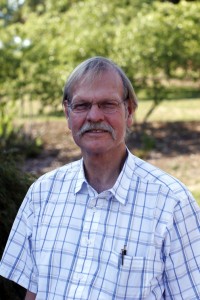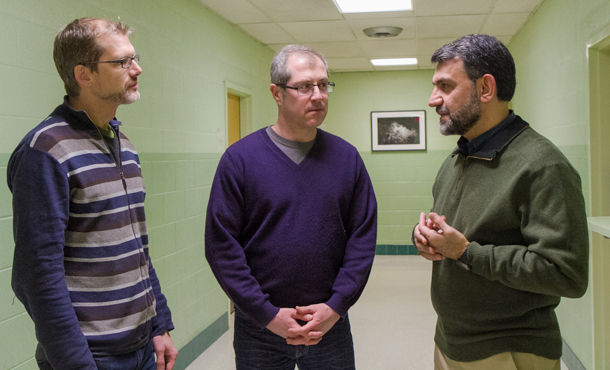Why would an explicitly Christian university go out of its way to bring Muslim and Jewish scholars to its campus to teach entire courses and interact every day with students?
That’s what is happening at Eastern Mennonite University.
“Interacting with people of other faiths builds friendship and understanding – something we sorely need in this world,” says Ed Martin, PhD, director of EMU’s Center for Interfaith Engagement (CIE), “and interfaith dialogue strengthens our own faith.”
This semester a Muslim professor from Iran is teaching “Islamic Spirituality” and a Jewish rabbi from New York City is teaching “Spiritual Writers and Spiritual Writings.” Both of them join an instructor from EMU’s Bible and religion department to lead a class on “Comparative Monotheisms: Judaism, Christianity and Islam.”

Focusing on the three Abrahamic religions
EMU is focusing on the three world religions that worship one God – Judaism, Christianity and Islam. Over the centuries Christians, Muslims and Jews have fought each other savagely. Millions have died in the name of their God. But the three religions share a common birthplace − the Middle East − and a common ancestor, Abraham. And they have enjoyed periods of peaceful co-existence.
CIE’s logo features Abraham’s tent, which the center ‘s website describes as “open to the four winds, a safe place of hospitality towards strangers and engagement with them.”
“In today’s world and in a pluralistic society like ours, it is important that our students learn to know people of other faiths,” says Martin. “Our students will be going to places − both in the United States and abroad − where they will encounter people of other faiths.”
Martin says the historic differences between the three religions are exacerbated today by the Israel-Palestine conflict, the rise of Muslim extremism, and the United States’ counter-attacks after the terrorist attack on New York City in 2001. He decries the prevalence of “Islamophobia” in the United States.
Course co-taught by Muslim, Jewish and Christian scholars
CIE, which is funded entirely by foundation grants and private donations, offers several courses each semester by visiting scholars. The team-taught “Comparative Monotheisms” course this semester draws two dozen undergraduates, graduate students, seminarians and members of the community.
“Students ask all sorts of questions, from theology to history, ancient or contemporary,” says the Muslim scholar, Amir Akrami, PhD. “However, the focus of our work is on prayer, scripture, reasoning, politics and action.”
Akrami, who has taught at EMU since September 2012, is from the Iranian Institute of Philosophy in Tehran. He was a regular participant in the internationally respected Building Bridges Seminars around the world.
Akrami’s wife, Sheida Shakouri Rad, PhD, joined him at EMU a year ago. She is teaching Farsi, the language of Iran, this semester. Last semester she taught “Women in Islam.” She is on leave from the University of Tehran, where she has been a professor for 15 years.
The two other professors for the comparative-monotheism course are Niles Goldstein, an award-winning author and ordained Reform Jewish rabbi, and Reuben Shank, an EMU adjunct faculty member who is Mennonite and studying for a doctorate in religion at the University of Virginia.
Films, interfaith peace camp, lessons from disaster work
The fifth CIE course this semester is “The Israeli-Palestinian Conflict in Film,” taught by Bob Bersson, PhD, a retired professor of art and art history at James Madison University in Harrisonburg and founder of the local Interfaith Initiative for Peace and Justice.
In addition to bringing scholars to campus, CIE offers an annual Interfaith Peace Camp for children each summer, which includes trips to the local mosque and synagogue. Other events have been a Wednesday film series and Thursday forums.
CIE’s director likes the way that interfaith engagement sometimes emerges from work on the ground at disaster sites, both at home and abroad. “People of different faiths find themselves working together,” says Martin, “and they get to know each other.”

One result of Martin’s interest is an upcoming speech at EMU on how “disasters blow down fences and make good neighbors” by a federal government official, who is a former Mennonite pastor. He is David Myers, and he will speak on March 20. He is a senior advisor at the Federal Emergency Management Agency in Washington D.C. and works in faith-based and neighborhood partnerships for both the White House and the Department of Homeland Security.
Martin experienced the connection between disaster relief and interfaith engagement first hand when a major earthquake hit Iran in 1990, killing more than 35,000 people. He worked at the time as program director for central and southern Asia for Mennonite Central Committee (MCC), a North American relief, development, and peacebuilding agency that works in about 60 countries.
MCC exchange welcomed in Iran
MCC wanted to respond to a country considered a U.S. enemy, “to demonstrate that we would respond to human need wherever it occurred, irrespective of the religion and politics of the country,” Martin says. But the United States and Iran had no diplomatic relations (and still don’t), making travel to Iran difficult, and MCC wondered whether the hardline Muslim government would welcome an overtly Christian aid agency.
“It turned out, however, that Iran was more comfortable with an explicitly Christian organization than with secular agencies,” says Martin. “They understand the motivation that comes from religious faith.” So MCC was able to establish a long-term relationship with the Iranian Red Crescent Society on disaster relief and reconstruction as well as assistance to refugees.
The post-earthquake work then led to interfaith dialogue in the form of student exchanges and Muslim-Christian conferences every two to three years. The sixth conference will be held this May in Qom, an Iranian city known for being a center of Islamic scholarship. Martin will attend, along with some EMU students.
Under the direction of Dr. Ed Martin
Martin was a program director with MCC from 1989 to 2007, based at its headquarters in Akron, Pa. After that he went to the American Friends Service Committee, an international Quaker organization, in Philadelphia. He helped build connections between Iranian institutions and the United States and advocated for better relations between the two countries.
He started his career as an MCC volunteer in Nepal, where he met his future wife, Kathy Yoder. Later he worked at the International Irrigation Management Institute in Sri Lanka. A graduate of Stanford University, Martin earned graduate degrees at Cornell University – a master’s in public administration and a doctorate in agricultural economics.
The vision for interfaith engagement at EMU grew out of conversations among faculty, resulting in a formal proposal to the Board of Trustees, which it approved in 2009. The center opened later that year in the seminary building, with seminary professor Gerald Shenk, PhD, as part-time director. Martin was appointed director in 2010, serving part time and commuting from Pennsylvania.
Near and far support
CIE’s largest donor to date is the Henry Luce Foundation of New York City, which has given $355,000 over three years.
A major local supporter is John Fairfield, PhD, co-founder of the Rosetta Stone language-software company and professor emeritus of computer science at James Madison University. “I enjoy getting inside the head of someone who thinks very differently than I do,” he says. “It’s like travel to a foreign country − makes you notice things in your own country you’d taken for granted.”
He adds: “CIE is where we Mennonites meet other kinds of Christians, Muslims, Jews, atheists, liberals, conservatives and all kinds of people who challenge our understanding, because we value their critique and insights. And of course we think we’ve got something to offer, and we challenge them pretty deeply too. They seem to appreciate it. We need each other.”
And that’s why EMU goes out of its way to bring people of different faiths together.
